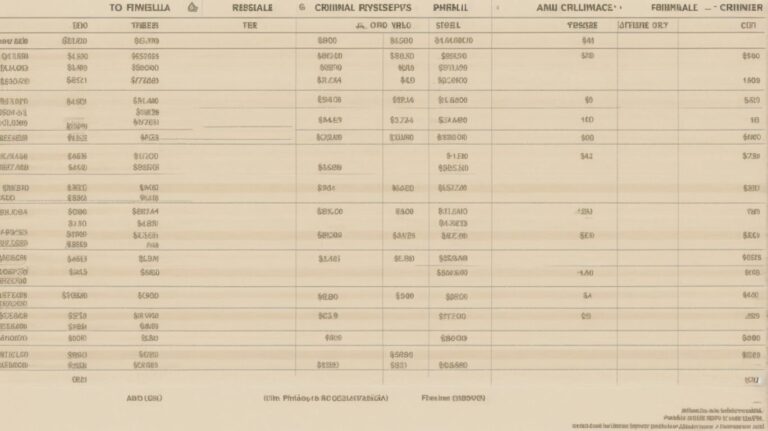Have you ever considered combining your passion for psychology with a career in law enforcement? A psychology degree can be a valuable asset for those aspiring to work for the Federal Bureau of Investigation (FBI).
In this article, we will explore the specific requirements for becoming an FBI agent, how a psychology degree can be useful in this field, and the specific roles for psychologists within the FBI. We will also provide tips on how to prepare for a career with the FBI while utilizing your psychology degree.
If you’re interested in a career at the intersection of psychology and law enforcement, keep reading to learn more!
Contents
- 1 Key Takeaways:
- 2 What is a Psychology Degree?
- 3 What is the FBI?
- 4 What are the Requirements to Become an FBI Agent?
- 5 How Can a Psychology Degree be Useful for a Career with the FBI?
- 6 What are the Specific Roles for Psychologists in the FBI?
- 7 How Can One Prepare for a Career with the FBI with a Psychology Degree?
- 8 Frequently Asked Questions
- 8.1 1. How can I utilize my psychology degree for a career with the FBI?
- 8.2 2. What types of roles can I apply for with a psychology degree at the FBI?
- 8.3 3. Are there any specific courses or specializations within psychology that would be beneficial for a career with the FBI?
- 8.4 4. Do I need to have prior law enforcement experience to utilize my psychology degree at the FBI?
- 8.5 5. Can I use my psychology degree at the FBI in other areas besides criminal investigations?
- 8.6 6. How can I gain experience in the field of psychology while pursuing a career with the FBI?
Key Takeaways:
What is a Psychology Degree?
A psychology degree encompasses the study of human behavior, cognition, and emotion, offering insights into the complexities of the human mind and its impact on individual and societal dynamics.
Psychology degrees offer a diverse range of specializations, including clinical psychology, counseling psychology, forensic psychology, and industrial-organizational psychology. Many academic institutions, such as Stanford University, Harvard University, and University of California, Berkeley, provide comprehensive programs catering to these specializations.
These programs equip students with a deep understanding of the theories and methodologies to assess, diagnose, and treat various psychological disorders. The practical applications of a psychology degree extend to various fields, such as healthcare, education, human resources, and even criminal justice.
Graduates with psychology degrees often pursue careers as clinical psychologists, counselors, human resource specialists, and market researchers, leveraging their knowledge to understand human behavior and improve the well-being of individuals and communities.
What is the FBI?
The Federal Bureau of Investigation (FBI) is a federal law enforcement agency operating within the United States Department of Justice, renowned for its role in investigating and combating criminal activities of national significance.
Established in 1908, the FBI has a rich history of upholding justice and national security. Its mission is to protect the United States from terrorist attacks, foreign intelligence operations, and cyber-based attacks while enforcing federal laws.
Its organizational structure comprises various divisions, including the Criminal, Cyber, and Counterterrorism Divisions, each specializing in specific areas of law enforcement.
As stated in its mission statement, the FBI aims to uphold and enforce the criminal laws of the United States and provide leadership and criminal justice services to federal, state, municipal, and international partners. The agency has been involved in landmark cases, such as the successful capture of notorious criminals and the dismantling of organized crime networks.
The FBI plays a critical role in maintaining national security through intelligence gathering and analysis, combating public corruption, protecting civil rights, and addressing white-collar crime. Its commitment to combating terrorism and upholding the rule of law has established it as a cornerstone of law enforcement in the United States.
What are the Requirements to Become an FBI Agent?
Becoming an FBI agent entails meeting rigorous educational, professional, and personal qualifications, along with successfully completing specialized training at the FBI Academy in Quantico, Virginia.
Applicants must possess a minimum of a bachelor’s degree from an accredited institution, preferably in a field such as criminal justice, psychology, or a related discipline.
Relevant work experience or previous service in law enforcement or the military is often valuable.
The FBI places great emphasis on physical fitness, requiring candidates to pass a Physical Fitness Test and meet specific standards for vision and hearing.
A rigorous background check delves into an applicant’s financial history, criminal record, and personal relationships, seeking individuals of utmost integrity and sound judgment.
Education
Education plays a pivotal role in the FBI agent selection process, with a considerable emphasis on academic qualifications and a strong foundation in relevant fields such as psychology, criminal justice, and law enforcement.
Aspiring FBI agents are encouraged to pursue psychology majors and criminal justice programs to gain a comprehensive understanding of human behavior, criminal law, and investigative techniques.
Moreover, specialized training from reputable institutions like the Federal Law Enforcement Training Centers and the FBI Academy can greatly enhance one’s skills and knowledge in law enforcement.
Work Experience
Work experience serves as a critical component of the FBI agent selection process, with an emphasis on practical exposure, relevant internships, and professional positions that demonstrate the candidate’s capabilities and commitment to law enforcement and investigative work.
Internships provide aspiring FBI agents with hands-on experience and a chance to apply their knowledge in real-world scenarios. This opportunity allows them to gain practical skills and understand the inner workings of the FBI. It also gives them a chance to showcase their abilities and potential to become successful agents.
Prior law enforcement roles, such as police officers or detectives, offer valuable insights into criminal procedures and case management. These experiences align closely with the demands of an FBI agent’s role, making them highly desirable candidates. They bring a unique perspective and understanding of the criminal justice system, which is crucial in the FBI’s investigations and operations.
Additionally, professional positions in fields like cybersecurity, intelligence analysis, and forensic accounting demonstrate a dedication to specialized areas that directly contribute to the FBI’s diverse operational needs. These skills and knowledge are highly sought after in the FBI, making these professionals valuable assets to the agency.
Physical Fitness
Physical fitness is a fundamental aspect of the FBI agent selection process, with specific standards and assessments designed to ensure that candidates possess the necessary strength, endurance, and overall fitness to perform demanding law enforcement duties.
The FBI has established rigorous physical fitness requirements to maintain the high level of physical readiness required for the role. These requirements encompass a range of exercises including push-ups, sit-ups, a 300-meter sprint, and a 1.5-mile run, all timed to assess candidates’ physical capabilities.
Candidates are tested for their ability to perform vertical jumps and complete obstacle courses, which are crucial for gauging their agility and overall physical prowess. Successful candidates must also demonstrate the ability to handle tactical firearms and defensive tactics effectively, reflecting the real-world demands they will face as FBI agents.
Background Check
The background check process is a comprehensive evaluation of an applicant’s personal, professional, and financial history, conducted to ensure the integrity, trustworthiness, and suitability of individuals seeking positions within the FBI and its National Center for the Analysis of Violent Crime (NCAVC).
This evaluation involves scrutinizing an applicant’s criminal record, employment history, education, and credit worthiness.
It includes interviews with references, neighbors, and associates to gain a comprehensive understanding of the individual’s character and reliability.
The NCAVC, a critical division of the FBI, uses advanced behavioral analysis to assess an applicant’s ability to handle high-stress situations and make sound judgments in complex scenarios.
How Can a Psychology Degree be Useful for a Career with the FBI?
A psychology degree offers valuable knowledge and skills that align with the FBI’s diverse operational requirements, particularly in areas such as criminal profiling, forensic psychology, and behavioral analysis, enhancing the agency’s capacity to understand and address complex human behaviors and motivations.
Professionals with a background in psychology play a crucial role in developing profiles of potential suspects, victims, and witnesses. They provide insights into their mental states and behavioral patterns, aiding in solving crimes and protecting national security.
Forensic psychology, a specialization within the field, contributes to evaluating suspects’ competency to stand trial and providing expert testimony in legal proceedings. Additionally, behavioral analysis, rooted in psychological principles, enables FBI agents to anticipate and interpret criminal behavior. This aids in the prevention and resolution of crimes.
Understanding Human Behavior
Psychology majors possess a deep understanding of human behavior, psychological principles, and the factors influencing individual and collective actions, providing valuable insights for developing behavioral composites and conducting criminal profiling within the FBI.
The knowledge and skills gained through studying psychology enable professionals to assess and analyze behavioral patterns, emotions, and cognitive processes. These are essential in identifying and understanding the motives and actions behind criminal behavior. This expertise contributes to the creation of behavioral composites that aid law enforcement in solving and preventing crimes.
By integrating psychological knowledge with criminal profiling techniques, psychologists can help to paint a more comprehensive and accurate picture of suspects. This enhances the efficiency and effectiveness of law enforcement efforts, allowing them to better understand and predict potential offenders.
Analyzing and Interpreting Data
Psychology majors are adept at analyzing and interpreting complex data sets, drawing meaningful conclusions, and identifying patterns in human behavior and psychological dynamics, skills that are highly relevant to various investigative and analytical tasks within the FBI.
Their analytical skills are honed through coursework in statistics, research methods, and data analysis, preparing them to approach complex datasets with precision and attention to detail.
Their deep understanding of psychological profiling equips them with insights into human motivations and behaviors, invaluable for investigating criminal cases.
Psychology majors’ ability to recognize and interpret behavioral patterns can significantly contribute to the FBI’s efforts in identifying and understanding criminal behavior.
Communication and Interviewing Skills
Psychology majors possess strong communication and interviewing skills, honed through academic research, clinical experiences, and interactions with diverse populations, providing them with the capabilities to effectively engage with individuals in various investigative contexts within the FBI.
Their proficiency in active listening, empathy, and rapport-building enables them to conduct investigative interviews with precision and sensitivity. This is crucial in extracting accurate information from witnesses and suspects.
Psychology majors excel in witness assessments, utilizing their understanding of human behavior to evaluate the reliability of testimonies and identify potential psychological biases.
In addition, their adeptness in inter-agency collaborations facilitates seamless communication and cooperation between different departments and agencies. This ensures a comprehensive approach to criminal investigations.
Profiling and Investigative Techniques
Psychology majors are well-equipped to understand and apply profiling and investigative techniques, drawing from their knowledge of forensic psychology, behavioral analysis, and real-world case studies, contributing to the FBI’s efforts in solving complex and high-profile cases.
The understanding of human behavior, mental processes, and psychological theories equips psychology majors with critical insight into the psychological motivations and behavioral patterns of individuals involved in criminal activities.
By integrating their knowledge of forensic psychology principles with investigative techniques, they can assist law enforcement agencies in creating accurate offender profiles and understanding the criminal mind.
Their proficiency in behavioral analysis gives them a unique advantage in deciphering patterns of behavior, identifying criminal intent, and predicting potential actions, ultimately aiding in the apprehension of perpetrators.
Real-world case studies provide invaluable practical insights, enabling psychology majors to apply theoretical knowledge to analyzing crime scenes, understanding victim behavior, and providing essential criminal profiling to enhance law enforcement investigations.
What are the Specific Roles for Psychologists in the FBI?
Psychologists play diverse and specialized roles within the FBI, contributing to the Behavioral Analysis Unit (BAU), the Crisis Negotiation Unit (CNU), and the Counterintelligence and Behavioral Assessment Program (CIBAP), addressing critical aspects of law enforcement, negotiation, and threat assessment.
Within the BAU, psychologists utilize their expertise in understanding criminal behavior to assist in criminal investigations, profiling, and developing strategies to apprehend perpetrators. They analyze crime scenes, evaluate behavioral patterns, and provide valuable insights to aid in identifying and apprehending criminals.
In the CNU, psychologists work closely with law enforcement teams to manage high-stakes negotiation situations. They offer psychological expertise to de-escalate crises, ensure safe outcomes, and establish rapport with individuals in crisis.
Within the CIBAP, psychologists contribute to strategic efforts to identify and counteract threats posed by foreign intelligence services and terrorist organizations. They employ their psychological insights to assess potential risks and vulnerabilities within the FBI and its operations.
Behavioral Analysis Unit (BAU)
The Behavioral Analysis Unit (BAU) within the FBI utilizes the expertise of psychologists to analyze criminal behavior, develop behavioral profiles, and provide critical insights for investigative strategies and law enforcement operations, contributing to the resolution of complex cases.
Psychologists play a pivotal role within the BAU, employing their understanding of human behavior to create accurate profiles of criminals, aiding in the identification and apprehension of offenders.
Their in-depth knowledge of psychological principles, such as behavioral patterns, motivations, and cognitive processes, allows them to assess and interpret evidence, leading to valuable breakthroughs in investigations.
Furthermore, psychological evaluations conducted by these experts provide law enforcement with a deeper comprehension of offenders’ mentalities, guiding prosecution strategies and enhancing the overall effectiveness of criminal justice procedures.
Crisis Negotiation Unit (CNU)
Psychologists in the Crisis Negotiation Unit (CNU) of the FBI offer expertise in communication, conflict resolution, and behavioral analysis to facilitate negotiations and resolve high-stakes situations, ensuring the safety and security of individuals and communities.
Through their depth of knowledge in human behavior, psychologists within the CNU play a pivotal role in developing negotiation strategies that consider the psychological aspects of the individuals involved.
This insight helps in crafting communication approaches that are tailored to de-escalate tense situations and build trust amidst heightened emotions.
Their contributions aid in understanding the motivations and thought processes of individuals in crisis, which is instrumental in formulating effective conflict resolution plans that prioritize peaceful resolutions while safeguarding the well-being of all parties involved.
The behavioral analysis conducted by these professionals allows for comprehensive assessments of the psychological dynamics at play, enabling the implementation of tactical interventions that mitigate the risks and potential harm in high-pressure scenarios.
Counterintelligence and Behavioral Assessment Program (CIBAP)
Psychologists in the Counterintelligence and Behavioral Assessment Program (CIBAP) leverage their expertise to assess and counter potential threats, provide psychological insights into espionage activities, and contribute to national security efforts through comprehensive behavioral analysis.
Psychologists in this field have a crucial role in detecting potential weaknesses in organizations and individuals that could be taken advantage of by adversaries. They conduct comprehensive psychological assessments and behavioral analyses to gain valuable insights into the intentions and motives of individuals involved in espionage or potential security breaches.
These experts also specialize in creating strategies to counteract psychological manipulation tactics used by foreign intelligence agencies. By understanding the psychological mechanisms involved, they can effectively strengthen the resilience of the country’s assets against these threats.
How Can One Prepare for a Career with the FBI with a Psychology Degree?
Preparing for a career with the FBI as a psychology major involves gaining relevant experience, developing a strong understanding of the criminal justice system, and networking with current FBI agents and professionals within the field, to acquire the necessary skills and insights for a successful application and career trajectory.
Developing a solid foundation in psychology provides valuable insights into human behavior, which is crucial in understanding and profiling criminals.
It is important to seek out internships or volunteer opportunities in forensic psychology, law enforcement agencies, or in related fields to gain practical experience. Understanding forensic procedures and the legal aspects of criminal investigations is also vital, as it forms the basis for collaborating with law enforcement agencies.
Connecting with current FBI agents through informational interviews or job shadowing can offer firsthand knowledge of the Bureau’s operations and culture.
Gain Relevant Experience
Acquiring relevant experience through internships, research opportunities, and active involvement in forensic psychology and criminal justice endeavors is crucial for individuals aspiring to pursue a career with the FBI as psychology majors.
Internships offer hands-on experience in the field, allowing individuals to understand the practical application of their academic knowledge in real-world scenarios.
Research roles provide opportunities to contribute to the development of forensic techniques, contributing to the advancement of investigative practices.
Active participation in forensic psychology initiatives enables aspiring FBI agents to gain insight into the behavioral aspects of criminal investigations, enhancing their understanding of psychological profiling and criminal behavior analysis.
Develop a Strong Understanding of Criminal Justice System
A comprehensive understanding of the criminal justice system, legal procedures, and the application of psychological principles within law enforcement contexts is essential for psychology majors preparing for a career with the FBI, fostering a holistic foundation for their future contributions.
Aspiring FBI agents must grasp the interplay between criminology, forensics, and criminal law to effectively tackle complex investigations and contribute to the pursuit of justice.
This necessitates a deep-seated knowledge of the American Psychological Association’s ethical guidelines, the psychopathology of offenders, and methods of behavioral analysis, all crucial elements in the field.
An understanding of the legal intricacies, such as search and seizure procedures, courtroom dynamics, and due process, give the power tos agents to navigate the legal landscape ethically and effectively.
Therefore, psychology majors aspiring to join the Bureau must integrate psychological insights seamlessly with legal knowledge, allowing them to contribute meaningfully to investigations and prosecutions.
Network with Current FBI Agents
Building professional relationships and networking with current FBI agents, professionals, and mentors provides psychology majors aspiring for an FBI career with invaluable insights, mentorship, and potential pathways for career advancement within the agency.
Connecting with FBI agents offers an inside look into the daily operations, challenges, and requirements of the agency. This allows aspiring agents to gain a deeper understanding of the organization’s culture and expectations.
Networking with experienced professionals can lead to mentorship opportunities, where seasoned agents can provide guidance, share their knowledge, and offer advice on navigating the complexities of an FBI career. Establishing a network within the FBI community can open doors to various career development possibilities, such as access to specialized training programs, job shadowing opportunities, and even potential job openings within the agency.
Frequently Asked Questions
1. How can I utilize my psychology degree for a career with the FBI?
The FBI values individuals with diverse educational backgrounds, including psychology. You can utilize your psychology degree for a career with the FBI by applying for positions such as Special Agent or Intelligence Analyst, as well as participating in internships or fellowships with the FBI.
2. What types of roles can I apply for with a psychology degree at the FBI?
As mentioned, you can apply for positions such as Special Agent or Intelligence Analyst. Additionally, there are opportunities in the Behavioral Analysis Unit, Crisis Negotiation Unit, and Victim Services Division, among others. Your psychology background can also be beneficial in roles related to research and analysis.
3. Are there any specific courses or specializations within psychology that would be beneficial for a career with the FBI?
While any psychology degree can be valuable, some courses or specializations that may be particularly relevant for a career with the FBI include abnormal psychology, forensic psychology, and criminal behavior. Additionally, courses in statistics and research methods can also be beneficial.
4. Do I need to have prior law enforcement experience to utilize my psychology degree at the FBI?
No, prior law enforcement experience is not required for all positions at the FBI. However, it can be helpful to have experience in related fields such as social work, counseling, or research. The FBI also values individuals with diverse backgrounds and experiences.
5. Can I use my psychology degree at the FBI in other areas besides criminal investigations?
Yes, the FBI utilizes psychology expertise in a variety of areas, including intelligence gathering and analysis, crisis management, and victim services. Additionally, there are opportunities for psychologists to work in research and analysis roles within the FBI.
6. How can I gain experience in the field of psychology while pursuing a career with the FBI?
There are several ways to gain experience in the field of psychology while pursuing a career with the FBI. One option is to participate in internships or fellowships with the FBI, which can provide hands-on experience and networking opportunities. Additionally, volunteering or working in related fields, such as crisis intervention or victim advocacy, can also be beneficial.





